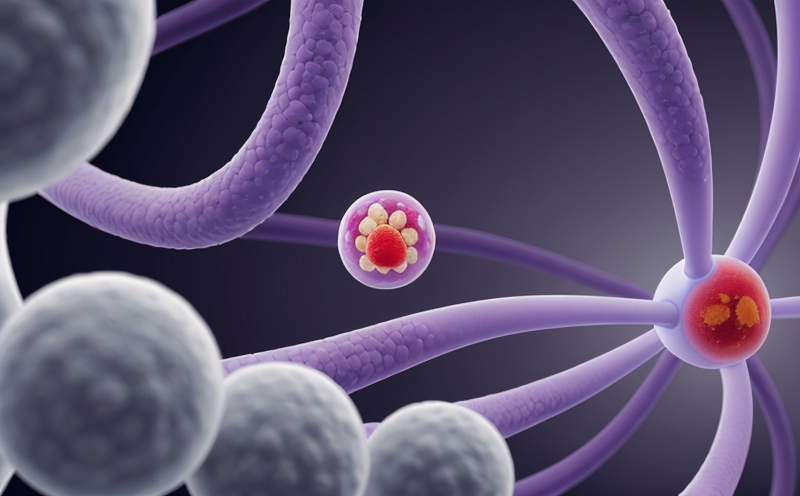Cyclin D1 Expression Testing in Preclinical Tumor Models
The assessment of cyclin D1 expression is a critical aspect in preclinical tumor model testing due to its pivotal role in driving cell cycle progression and promoting uncontrolled growth. Cyclin D1, one of the key components regulating the G1-S transition, has been extensively studied for its association with various types of cancer, including breast, lymphoma, and multiple myeloma.
Cyclin D1 expression is often elevated in tumor cells, which can contribute to cell proliferation. This overexpression is frequently linked with poor prognosis and increased aggressiveness of the disease. Therefore, accurate measurement of cyclin D1 levels provides valuable insights into the behavior of tumors and helps researchers identify potential therapeutic targets.
Our service focuses on quantifying cyclin D1 expression in preclinical tumor models using state-of-the-art technology that ensures precision and reliability. This includes the use of immunohistochemistry (IHC) techniques, which are particularly useful for detecting protein levels within tissue sections. Our team employs standardized protocols based on international standards such as ISO 15189 to ensure consistent results.
For specimen preparation, fresh or formalin-fixed paraffin-embedded samples from tumor models are carefully processed according to our stringent quality control measures. The use of high-quality antibodies is crucial for obtaining accurate measurements; hence we rigorously select and validate these reagents using well-established methods.
The testing process involves several steps:
- Fixation and embedding of tissue samples
- Slicing sections for analysis
- Antibody incubation to detect cyclin D1 expression
- Digital imaging and quantification of the stained areas
The results are presented in a comprehensive report that includes quantitative data along with comparative analyses if multiple samples or conditions are being evaluated. This information is invaluable for researchers aiming to understand the role of cyclin D1 in tumor development and progression.
By leveraging this service, clients can gain deeper knowledge about their preclinical models, which could lead to more effective drug discovery processes targeting specific pathways involved in cancer biology. Furthermore, by adhering strictly to international standards, we provide results that are both reproducible and internationally recognized.
Applied Standards
The testing of cyclin D1 expression follows several key standards that ensure the accuracy and reliability of our measurements:
- ISO 15189: This standard sets forth stringent requirements for quality management systems in medical laboratories, ensuring that all tests conducted adhere to high levels of proficiency.
- American Society for Testing and Materials (ASTM) E2376-14: Provides guidelines for the evaluation of antibodies used in immunohistochemical staining.
- European Pharmacopoeia (EP): Offers specifications for the production, quality control, and testing procedures applicable to pharmaceuticals.
- International Conference on Harmonisation (ICH) M6: Guides the development of investigational medicinal products by providing recommendations on non-clinical safety studies.
These standards are integral to our service because they provide a framework for consistent and accurate testing, thereby enhancing trust in the results provided.
Why Choose This Test
Cyclin D1 expression testing is essential for several reasons. Firstly, it offers valuable insights into tumor biology, helping researchers understand how certain proteins contribute to cancer progression. Secondly, this test can aid in predicting patient outcomes by correlating cyclin D1 levels with clinical responses to treatment.
Our service stands out due to its adherence to stringent quality standards and advanced analytical techniques. The precision of our results allows for better informed decisions during the drug development process. Additionally, by offering comprehensive reports that include comparative analyses across different samples or conditions, we support robust scientific conclusions.
For clients involved in pharmaceutical research and development, this service represents an indispensable tool. It enables them to identify novel biomarkers associated with specific types of cancer, ultimately leading to more personalized treatments. Moreover, compliance with international standards ensures that the findings are widely accepted within the scientific community.
Environmental and Sustainability Contributions
Incorporating sustainability into our laboratory practices is a priority. By adhering strictly to ISO 15189, we minimize waste generation through efficient sample handling processes. Our use of digital imaging for quantification reduces paper usage significantly while enhancing accuracy.
Additionally, by ensuring that all reagents and materials used meet environmental criteria set forth in international standards such as ASTM E2376-14, we contribute to reducing the ecological footprint associated with laboratory operations.
- Reduced Paper Usage: Digital imaging replaces traditional paper-based methods for data recording and storage.
- Eco-Friendly Reagents: Selection of reagents that comply with environmental guidelines helps reduce harmful impacts on natural resources.
- Efficient Sample Handling: Optimized protocols minimize unnecessary sample preparation steps, thus conserving resources.
Our commitment to sustainability extends beyond our internal practices. We encourage clients to consider these factors when planning their research projects, promoting a more responsible approach towards conducting preclinical studies.





